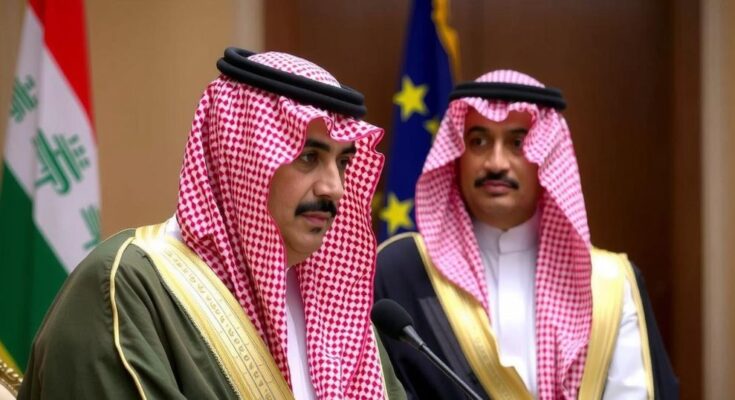Saudi Arabia’s recent meeting with EU diplomats in Riyadh centered on urging the lifting of sanctions against Syria to support its post-conflict recovery. While Saudi officials advocate for immediate action, concerns remain among U.S. and European representatives due to the Islamist roots of the new Syrian leadership, which must demonstrate a commitment to democratic governance for sanctions to be reconsidered.
On Sunday, Saudi Arabia convened with prominent European Union diplomats in Riyadh to deliberate the ongoing situation in Syria. Central to the discussions was Saudi Arabia’s appeal for the lifting of sanctions imposed on Syria, aimed at fostering the nation’s recovery and revitalizing its economy following the fall of Bashar al-Assad’s regime in December 2024.
The United States and EU nations, however, expressed caution, attributing concerns to the Islamist affiliations of Syria’s new leadership, which consists of former rebels. Their willingness to remove sanctions remains contingent upon demonstrable advancements in the political transition towards a more pluralistic governance structure, as articulated by the interim government.
Syria has endured a grueling civil conflict lasting almost 14 years, resulting in approximately 500,000 fatalities and the displacement of half of its previous 23 million strong population. New Syrian Foreign Minister, Assad al-Shaybani, participated in this pivotal meeting, emphasizing the importance of international support in the recovery process. In response to these discussions, Kaja Kallas, the EU High Representative for Foreign Affairs and Security Policy, announced an upcoming meeting of EU foreign ministers in late January to evaluate the potential lifting of the sanctions against Syria.
The backdrop of this meeting in Saudi Arabia stems from a prolonged civil war in Syria that began in 2011, leading to drastic humanitarian crises and severe economic decline. The overthrow of Bashar al-Assad’s regime marks a significant turning point. While the interim government has pledged to establish a democratic framework, international relations remain tense, particularly with the underlying fears regarding the Islamist sentiments of the new leadership. The international community, especially EU and US representatives, remains cautious about rewarding the new regime before confirming their commitment to democratic principles and stability.
In summary, Saudi Arabia conducted crucial discussions with EU diplomats regarding the sanctions on Syria, highlighting the need for these measures to be lifted to accelerate the nation’s rebuilding process. The U.S. and European nations continue to express apprehension concerning the Islamist affiliations of the new government leaders, tying the lifting of sanctions to their progress towards a broad-based democratic government. This intricate geopolitical situation underscores the delicate balancing act facing international stakeholders in responding to the evolving dynamics within Syria.
Original Source: newsukraine.rbc.ua




